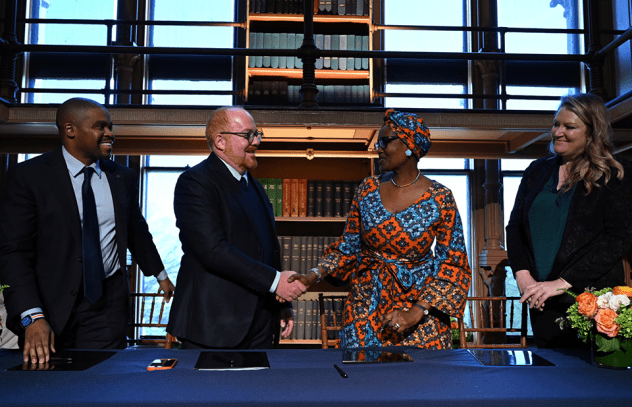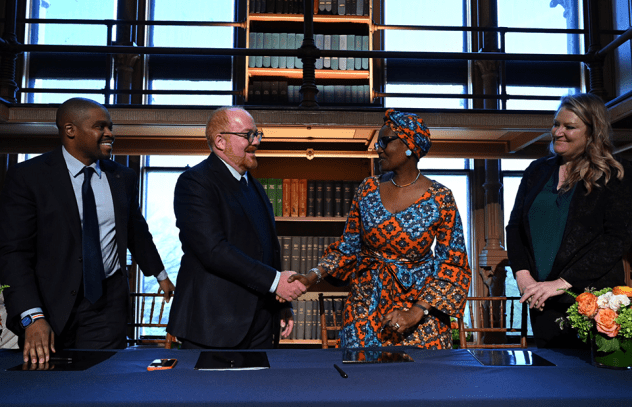The Joint United Nations Programme on HIV/AIDS (UNAIDS) designated Georgetown University’s Global Health Policy and Politics Initiative as a United Nations Collaborating Center on April 12.
As a designated Collaborating Center, Georgetown’s Global Health Policy and Politics Initiative will work with the U.N. to prepare activities, develop consultative meetings, and collaborate on sharing data and analyses. With the new partnership, the center will have access to more resources and tools to tackle the HIV/AIDS pandemic.
The Global Health Policy and Politics Initiative is a combined effort between the School of Health and the O’Neill Institute for National & Global Health Law focused on pioneering effective policy responses to global health challenges, including HIV/AIDS. The initiative is currently working on projects to improve community monitoring and to collect data on global services that respond to prominent health issues, such as HIV/AIDS and tuberculosis.
According to Lawrence Gostin, faculty director of the O’Neill Institute, the partnership with UNAIDS will allow Georgetown to expand its connections to global resources dedicated to fighting HIV/AIDS.
“HIV/AIDS is a global health problem and having the privilege of partnering with UNAIDS to help people gain access to public health protection is a wonderful opportunity for us,” Gostin told The Hoya. “UNAIDS is the only U.N. program that combines all 11 specialized U.N. agencies – it is a U.N.-wide agency that is trying to fight HIV/AIDS.”
Gostin said the center’s focus on global health law and policy stems from the idea that combatting complex global health challenges like HIV/AIDS cannot occur with the use of medicine alone.
“You need an interdisciplinary approach,” Gostin said. “You need strong and effective laws, impactful institutions and human rights. HIV/AIDS is such an overwhelming and complex global problem that there is no single discipline that can be used to solve it.”
Matthew Kavanagh, director of the Global Health Policy and Politics Initiative at the O’Neill Institute, said that this interdisciplinary capacity is one of the unique strengths that Georgetown offers as a host for an UNAIDS Collaborating Center.
“We have fantastic lawyers, epidemiologists, political scientists who understand how power and government work within health, and experts in areas of health specific to HIV/AIDS. We can all come together to address the HIV/AIDS pandemic,” Kavanagh told The Hoya.
According to the 2022 UNAIDS report, gay men and men who have sex with men have a risk of acquiring HIV that is 28 times higher than that of other adult men. In sub-Saharan Africa, young women aged 15-24 years are twice as likely to be living with HIV than young men of the same age.
“We can see how inequalities are being driven by geography, gender and sexuality. These things come together to say that, fundamentally, HIV infections and deaths in the U.S. plummeted because of access to effective science and technology,” Kavanagh said. “It’s access to the science that is important for stopping the HIV/AIDS pandemic.”
The newly designated Collaborating Center is engaging in a set of research projects to better understand how these policies are impacting those inequalities, as well as how to improve them. Kavanagh said researchers at the institute have been analyzing case studies of countries that have created highly effective policies to gain an understanding of how to ensure affordable treatment and technologies for all.
Sharonann Lynch, senior scholar at the Global Health Policy and Politics Initiative, said that the center will further strengthen the HIV Policy Lab, which collects and disseminates HIV/AIDS laws and policies around the world. By working together with UNAIDS on such projects, Lynch hopes the center can provide an even more forceful pushback to damaging policies.
“If there’s inequity in terms of how people are seen and valued, there will be major repercussions all around, including access to healthcare,” Lynch told The Hoya. “The HIV/AIDS pandemic is a complex ecosystem of laws, human rights and science, which should all be reflected in national policies and services.”

Kavanagh believes the global response to HIV/AIDS provides an important learning opportunity for future global health challenges, as the legal and policy efforts needed to address HIV/AIDS are repeatedly found to be needed in other pandemics.
“The core question is no longer which medicine will work, but how we can deliver the medicine to people who need it through law and policy,” Kavanagh said. “How do we break the political, social and legal barriers that are preventing the solution to HIV/AIDS?”









